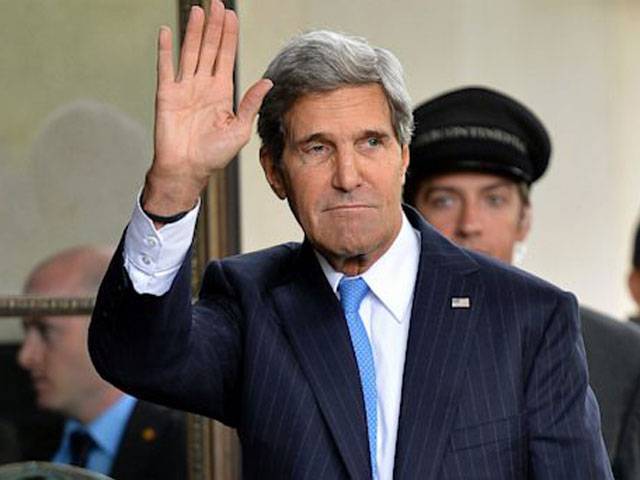GENEVA - Washington and Moscow said Friday they hoped talks on dismantling Syria’s chemical arsenal would open the door to wider peace efforts, as they held a second day of high-stakes meetings.
As the two met in Geneva, US Secretary of State John Kerry said he and Russian counterpart Sergei Lavrov would meet again later this month - probably around September 28 - to try to set a date for a long-delayed peace conference.
He said Washington and Moscow were ‘working hard to find common ground’ to implement peace talks in Geneva that would bring together Syrian President Bashar al-Assad’s regime and the opposition to negotiate a political solution to the conflict.
Much of the way forward “will obviously depend on the capacity to have success here in the next day, hours, days, on the subject of the chemical weapons,” Kerry told reporters after meeting with Lavrov and the United Nations-Arab League envoy to Syria, Lakhdar Brahimi.
Lavrov said he also hoped a “basically abandoned” peace plan first agreed in Geneva in June last year would be revived.
“We agreed to meet in New York in the margins of the (UN) General Assembly and see where we are, and what the Syrian parties think about it and do about it,” Lavrov said.
Washington and Moscow are hammering out the details of dismantling Assad’s chemical arsenal under a Russian plan that emerged this week - kickstarting long-stalled diplomatic efforts on Syria.
The last-minute Russian initiative caused US President Barack Obama to back away from planned military strikes in response to a chemical attack that allegedly killed hundreds of people last month. Assad confirmed for the first time Thursday that Syria planned to relinquish its chemical arms, and Russian President Vladimir Putin urged the global community to take him seriously.
Fuelling concerns about Assad’s sincerity, reports emerged Friday that a secret Syrian military unit was scattering the chemical weapons stockpile around the country. The unit was given responsibility to shift the arsenal of poison gases and munitions to different locations across Syria, the Wall Street Journal reported, citing US and Middle Eastern officials.
Kerry and Lavrov are being joined in Geneva by large teams of weapons experts, with specialists warning that any programme to dismantle Syria’s reported 1,000 tonnes of chemical weapons would be extremely complicated.
Russia has not revealed many details of its plan, but Russian media reports say it calls for a four-step process for the weapons handover.
Reports say the plan calls for Damascus to join the Organisation for the Prohibition of Chemical Weapons (OPCW), declare the locations of its chemical arms, allow OPCW inspectors access and finally arrange for destruction of the arsenal.
The United States and France, Washington’s main backer for military strikes, have warned they will not allow the chemical weapons plan to become a delaying tactic in Syria’s conflict, which has claimed more than 110,000 lives since March 2011.
Russia, which backed by China has blocked any attempt to sanction Syria through the UN, vigorously opposes military strikes.
Washington alleges that about 1,400 people died in the chemical attack on August 21 in the Damascus suburbs.
UN inspectors are due to release the results of an investigation into the attack early next week, and a report in the Times of London Friday said they would blame the Assad regime for the attack.
Meanwhile, the United Nations has asked Syria for more information about its application to join the chemical weapons convention, holding up accession, a spokesman said Friday.
Syria applied to the United Nations on Thursday as part of a plan to head off a western military strike against President Bashar al-Assad over the alleged use of banned chemical arms.
“We are in touch with the Syrian government about their application. We are trying to obtain some further information so that the accession process can be completed,” said a UN spokesman Farhan Haq.
He declined to say what information was missing. Syria had been one of seven UN members that have refused to join the 1993 convention banning the production and stockpiling of chemical arms.
Assad’s government announced it would sign up as it faced a growing threat of a US military strike and Russia proposed a plan to put his country’s chemical arsenal under international control.
The United States and other western nations accuse Assad’s forces of launching a sarin gas attack on August 21 near Damascus in which hundreds died. The government blames opposition rebels for the attack.
Friday, April 19, 2024
Syria peace hinges on Geneva talks
UN says Damascus’ chemical treaty application not complete

9:07 PM | April 18, 2024
King Charles's cancer ‘eating him alive,' monarch unable to perform duties: Insider
1:02 AM | April 19, 2024
Mehwish Hayat says she would like to work with Aamir Khan
9:59 PM | April 18, 2024
What caused record-breaking rainfall in UAE?
9:58 PM | April 18, 2024
Donald Trump discusses Ukraine, Middle East, NATO with Polish President Duda
9:57 PM | April 18, 2024
'That'll be awesome,' Rohit Sharma on idea of Pakistan vs India Test series
9:17 PM | April 18, 2024
Hepatitis Challenge
April 18, 2024
IMF Predictions
April 18, 2024
Wheat War
April 18, 2024
Rail Revival
April 17, 2024
Addressing Climate Change
April 17, 2024
Justice denied
April 18, 2024
AI dilemmas unveiled
April 18, 2024
Tax tangle
April 18, 2024
Workforce inequality
April 17, 2024
New partnerships
April 17, 2024
ePaper - Nawaiwaqt
Advertisement
Nawaiwaqt Group | Copyright © 2024





